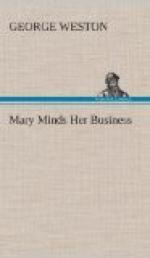At ten o’clock she telephoned Helen who told her that Wally had just fallen off into his first quiet sleep.
“I’m going to get some sleep myself, now, if I can,” she added. “The nurse has promised to call me when he wakes.”
Mary breathed easier, for some deep instinct told her that Wally would come through it all right. She was still smiling with satisfaction when Joe of the Plumed Hair came in with three cards, the dignity of his manner attesting to the importance of the names.
“All right, Joe, send them in,” she said. “And I wish you’d find Mr. Forbes and Mr. Woodward, and tell them I would like to see them.”
“Mr. Woodward hasn’t come down yet, but I guess I know where Mr. Forbes is—”
He disappeared and returned with the three callers.
Mary arose and bowed as they introduced themselves, meanwhile studying them with tranquil attentiveness.
“The judge was right,” she told herself. “I like them.” And when they sat down, there was already a friendly spirit in the air.
“This is a wonderful work you are doing here, Miss Spencer,” said one.
“You think so?” she asked. “You mean for the women to be making bearings?”
“Yes. Weren’t you surprised yourself when your idea worked out so well?”
“But it wasn’t my idea,” she said. “It was worked out in the war—oh, ever so much further than we have gone here. We are only making bearings, but when the war was on, women made rifles and cartridges and shells, cameras and lenses, telescopes, binoculars and aeroplanes. I can’t begin to tell you the things they made—every part from the tiniest screws as big as the end of this pin—to rough castings. They did designing, and drafting, and moulding, and soldering, and machining, and carpentering, and electrical work—even the most unlikely things—things you would never think of—like ship-building, for instance!
“Ship-building! Imagine!” she continued.
“Why, one of the members of the British Board of Munitions said that if the war had lasted a few months longer, he could have guaranteed to build a battleship from keel to crow’s-nest—with all its machinery and equipment—all its arms and ammunition—everything on it—entirely by woman’s labour!
“So, you see, I can’t very well get conceited about what we are doing here—although, of course, I am proud of it, too, in a way—”
She stopped then, afraid they would think she was gossipy—and she let them talk for a while. The conversation turned to her last advertisement.
“Are you sure your figures are right?” asked one. “Are you sure your women workers are turning out bearings so much cheaper than the men did?”
“They are not my figures,” she told them. “They are taken from an audit by a firm of public accountants.”
She mentioned the name of the firm and her three callers nodded with respect.




